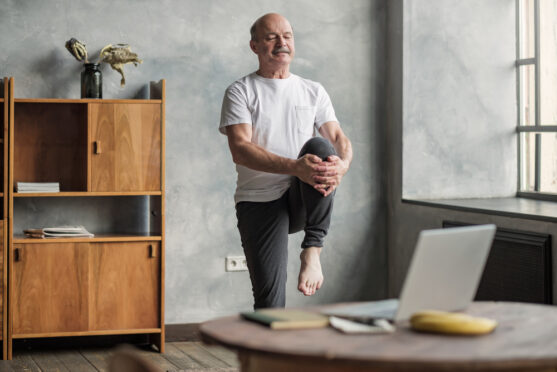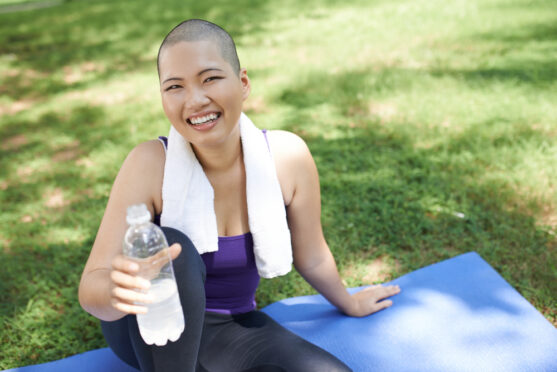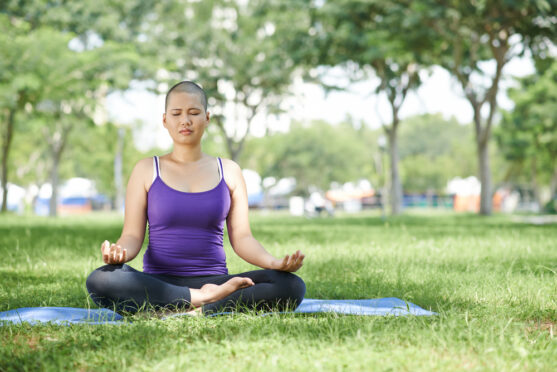Research shows that staying physically active during different phases of your cancer treatment improves your physical as well as mental health.
Most cancer patients face tiredness, weakness, body aches and other side effects during cancer treatment. This might reduce the amount of physical activity in their life. Gentle exercises can help them regain their strength and mobility.

Even those who did not lead an active lifestyle before their cancer diagnosis can consider starting with some easy and light exercises during their treatment, as it improves their overall health and improves chances of a successful treatment.
Before you start with any physical exercise, it is important to speak with your doctor to check that it is safe for you. Every patient is different and the exercises that work for one, may not work for another.
The golden rule is to do only as much as you are comfortable with. If you find yourself feeling tired, out of breath, or experiencing any pains, you should immediately stop and inform your doctor about it.
Here are some basic types of exercises that you should be able to start with:
-
Breathing exercises
Breathing exercises are one of the simplest forms of exercise to begin your fitness journey.
You can try deep breathing with longer, slower inhalation, followed by exhalation. Some find it relaxing to do this with their eyes closed. There are many useful YouTube videos on deep breathing and meditation that might help you relax and improve your breathing.

Abdominal breathing is another simple exercise that requires you to place your hand on your abdomen and push your hand (along with abdomen) using your breath.
Apart from being very good for your lungs, and overall physical health, it also improves your mental health by reducing anxiety and stress.
-
Stretching exercises
Light stretching exercises help improve your flexibility and improve your posture. But like most forms of exercise, you will need to start small and increase very gradually. Over-doing stretching exercises can leave you with aches, cramps and even injuries.

A simple shoulder stretch, or a leg stretch can be a good way to start. Stretching your legs can also reduce incidence of leg cramps during cancer treatment.
For those suffering from lymphedema, this video can help you avoid swellings and pain in the arm near your surgery site.
-
Balance exercises
Try standing on one leg for 10 seconds. The switch to the other leg. Simple exercises like this one can help you improve your balance.

For those who are able to do more, work-outs like bridges, and pelvic tilts can help. A balance board can also help improve balance and muscle strength.
Avoid trying these exercises when you are alone, if you are still struggling to maintain your balance. You can stay by using support like a wall, a chair or a friend’s shoulder.
-
Aerobic exercises
Walking around the block or simply pacing the room you are in also count as aerobic exercises. Remember to stop as soon as you feel uncomfortable.

Doing a few light stretching exercises before you begin can reduce your chance of sprains and injuries from aerobic exercises.
Remember to pace yourself and also have water handy so that you keep yourself hydrated.

For those who are able to try more strenuous exercises, cycling or sports like tennis are great forms of aerobic exercises. These types of exercises do increase your heart rate considerably. You may find yourself sweating, and out of breath within a few minutes. Ensure your doctor has approved of such forms of exercise before you attempt them.
-
Yoga
Certain yoga positions and forms may be suitable for you. If you practise yoga as a part of a group, remember to inform your instructor of your medical history. Avoid pushing yourself and continue at a pace that is comfortable for you.

While it is good to stay active, it’s also important to get adequate rest, stay hydrated and also consume a sufficient amount of calories. Without rest and nutrition, exercises cannot bear positive results.
You can find some great ideas for staying physically active here.

